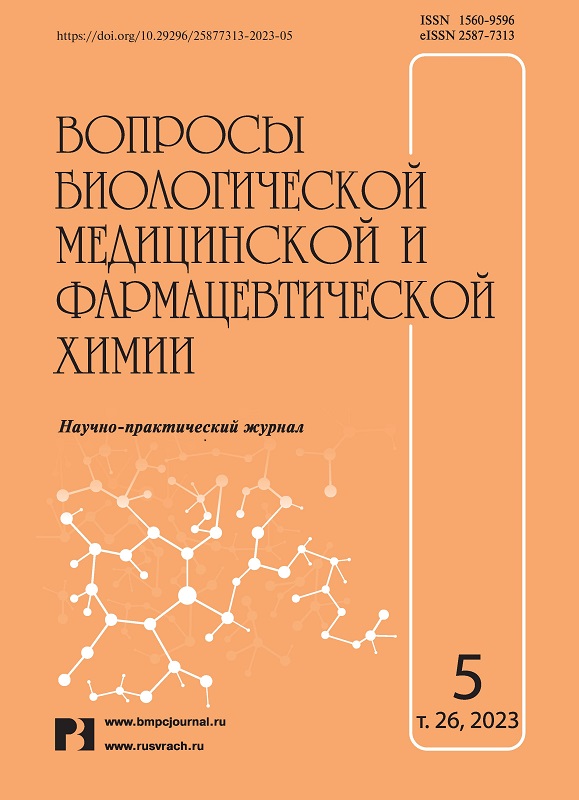Ecological and hygienic assessment of quality flower of tanacetum vulgare agro- and urbanbiocenoses of the Voronezh region
- Authors: Dyakova N.A.1
-
Affiliations:
- Voronezh State University
- Issue: Vol 26, No 5 (2023)
- Pages: 38-42
- Section: Pharmaceutical chemistry
- URL: https://journals.eco-vector.com/1560-9596/article/view/456468
- DOI: https://doi.org/10.29296/25877313-2023-05-06
- ID: 456468
Cite item
Abstract
An important and little-researched aspect of the effect of human economic activity on medicinal plants is that in response to an increase in anthropogenic load, additional synthesis of secondary metabolites, especially flavonoids, is induced, which play an important role in adapting plants to changing conditions. The purpose of the study was to study the accumulation of flavonoids and phenol carboxylic acids in the flowers of Tanacetum vulgare, collected in various agricultural and urbobiogeocenoses of the Voronezh region from the point of view of anthropogenic impact. As part of the study, 51 samples of Tanacetum vulgare flowers determined the content of heavy metals and arsenic and the sum of flavonoids and phenol carboxylic acids in terms of luteolin. By comparing the data on the content of heavy metals in the upper soil layers of the region and the content of these elements in the flowers of Tanacetum vulgare, it can be argued that there are significant physiological barriers that prevent the accumulation of ecotoxicants in the generative organs of the plant, which is especially noticeable for elements such as lead, mercury, arsenic, cadmium, cobalt and chromium. It turned out that ordinary pyjma is able to selectively concentrate copper and zinc. It was revealed that in the flowers of Tanacetum vulgare collected in agrobiogeocenoses and urbocenoses, the content of flavonoids and phenolcarboxylic acids is higher than in samples from protected areas, which is explained by the fact that the key enzyme for the synthesis of flavonoids – phenylalaninammiacliase – has a pronounced stress inducibility. Under conditions of excessive toxic influence of pollutants, it is also possible to suppress the antioxidant system of plants.
Keywords
Full Text
About the authors
N. A. Dyakova
Voronezh State University
Author for correspondence.
Email: Ninochka_V89@mail.ru
Ph.D. (Biol.), Associate Professor, Department of Pharmaceutical Chemistry and Pharmaceutical Technology
Russian Federation, VoronezhReferences
- Dyakova N.A., Slivkin A.I., Gaponov S.P. Assessment of efficiency and safety of medicinal plant raw materials of planter large, collected in Central Chernozemye [Evaluation of efficiency and safety of medicinal plant raw materials of large planter collected in Central Chernozome]. Journal of VSU. Series: Chemistry, Biology, Pharmacy. 2018. 1: 124–131.
- Dyakova N.A., Slivkin A.I., Gaponov S.P., Myndra A.A., Samylina I.A. Analysis of the relationship between the accumulation of pollutants and principal groups of biologically active substances in medicinal plant raw materials using knotweed (Polygonum aviculare L.) and broadleaf plantain (Plantago major L.) leaves as examples. Pharmaceutical Chemistry Journal. 2015; 49(6): 384–387.
- Velikanova, N.A., Gaponov S.P., Slivkin A.I. Ehkoocenka lekarstvennogo rastitel'nogo syr'ya v urbousloviyah g. Voronezha [Ecological assessment of medicinal vegetable raw materials in the urbousloviyakh of Voronezh]. LAMBERT Academic Publishing, 2013: 12–17.
- Kurkin V.A. Farmakognoziya. Samara: Ofort. 2004: 406–410.
- Bayandina I.I., Zagurskaya Yu.V. Vzaimosvyaz' vtorichnogo metabolizma i himicheskih elementov v lekarstvennyh rasteniyah [Relationship of secondary metabolism and chemical elements in medicinal plants]. Sibirskij medicinskij zhurnal. 2014; 8: 107–111.
- Loreto F., Schnitzler J.-P. Abiotic stresses and induced biogenic volatile organic compounds. Trends in Plant Science. 2010; 15: 154–166.
- Ferdinando M.D., Brunetti C., Fini A., Tattini M. Flavonoids as Antioxidants in Plants Under Abiotic Stresses. Abiotic stress responses in plants: metabolism, productivity and sustainability. NY: Springer New York. 2012: 159–179.
- Gosudarstvennaya farmakopeya Rossijskoj Federacii. Izdanie XIV [State pharmacopeia of the Russian Federation. Edition XIV], 2018, Vol. 2, Moscow, FEMB: 6328–6335.
- Dyakova N.A. Ekologicheskaya ocenka lekarstvennogo rastitel'nogo syr'ya Voronezhskoj oblasti na primere cvetkov pizhmy obyknovennoj [Ecological assessment of medicinal plant raw materials of the Voronezh region on the example of common pyzhma flowers]. Bulletin of Nizhnevartovsk State University. 2020; 1: 19–26.
- Dyakova N.A. Ocenka zagryazneniya tyazhelymi metallami verhnih sloev pochv urbo- i agroekosistem Central'nogo Chernozem'ya [Assessment of contamination by heavy metals of the upper layers of soils of the urb- and agroecosystems of the Central Black Earth Region]. Scientific and practical journal "Bulletin of the IrGSHA". 2019; 95: 19–30.
Supplementary files







